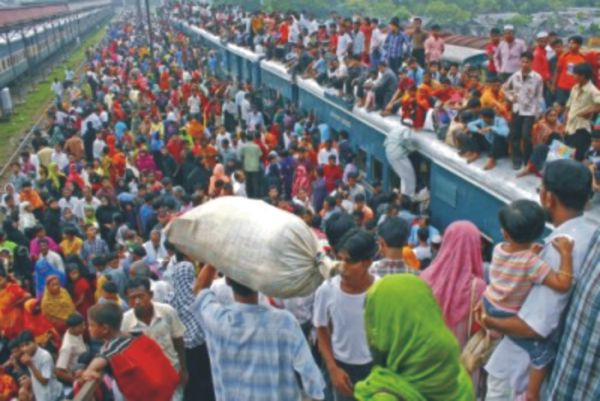
Inside
Original Forum |
| Causes of RMG unrest -- Refayet Ullah Mirdha |
| Who Pushes the Price up? -- Asjadul Kibria |
| Padma Bridge: Dream vs reality -- Mohammad Abdul Mazid |
Self-financing Padma Bridge -- Nofel Wahid |
| Unaccountability in Private Medical Services -- Mahbuba Zannat |
Medical Waste --- Mushfique Wadud |
Abysmal state of Emergency Medical Services |
On Clinical Negligence -- Eshita Tasmin |
The Population Growth Conundrum -- Ziauddin Chowdhury |
| Rohingyas and the 'Right to Have Rights' -- Bina D' Costa |
| Two-State Solution: Israeli-Palestinian Peace -- Dr Kamal Hossain |
| Forms of Government -- Megasthenes |
A Letter from Alghamdy and War Crimes Trial |
The Population Growth Conundrum
ZIAUDDIN CHOUDHURY proposes ways to tackle our looming population problem.
 Adnan /DRIK
Adnan /DRIK
A few weeks ago, the Bangladesh Institute of Development Studies came up with an estimate of little over 142 million as the current population of Bangladesh. This figure, we were told, had been arrived at after adjustment of the findings and projections of the last countrywide census (2010). Mind you, this new population estimate flies in the face of a population estimate of 152 plus million given by the UN Agency -- UNFPA -- only six months earlier. And if you look further around, you will find that the World Bank Atlas some time ago, gave an estimate of over 160 million as the total population of the country in the previous year. Which figure do we take, or should we stop splitting hairs on this estimate and attend to the more serious matter of how to manage this large population?
According to demographic experts between 2000 and 2015, about 1 billion people will be added to the world. Among the top 10 contributors to this growth, Bangladesh ranks seventh (top three being India, China and Pakistan). We are nearly at the end of this fifteen year growth cycle, and we already know that in Bangladesh we added some 50 million in the last 12 years to our population. And this addition has occurred despite our success in bringing down the annual growth from nearly 3.5% in the early 1970s to less than 2% in the last decade.
The debate should not be about what is the actual number of our population now. The debate should not be about who has the right estimate -- the UN Agency, the World Bank, or our own research institute. It really does not matter whether the estimate is off by a few million. What matters is how we feed, educate, employ and provide health care to this burgeoning population. Even at the current low growth rate we will have a total population of roughly 170 million by 2020; that is over 1180 people per square kilometre -- the highest in the world leaving aside some city states. This is an unavoidable growth, one that has to be managed not by suppressing or manipulating statistics, but by careful planning, realistic programmes and pragmatic leadership. This planning has to have high focus in strategies and programmes to lift people from poverty, avoid hunger and famine, raise productivity and provide employment.
This is a huge challenge for us as we step into our fifth decade of existence as a sovereign country. Our leadership, those who are running the government now and those aspiring to run it in the future, needs to take cognizance of the challenges and prepare the country accordingly.
 |
|
Munem Wasif/DRIKN |
The first challenge is how to lift people from poverty and prevent hunger and famine in the future. According to a recent World Bank publication (More and Better Jobs in South Asia) the whole of South Asia Region faces an enormous employment challenge. An estimated 1.0-1.2 million new entrants will join the labour market every month over the next few decades -- an increase of 25-50% over the average number of entrants between 1990 and 2010. The employment challenge for the region is to absorb these new entrants into jobs at rising levels of productivity. This productivity has to come from generation of employment in the rural areas mainly since agriculture will continue to be the largest employer in Bangladesh in the foreseeable future. In parallel we also need to focus on agricultural diversification moving away from cereal production only to higher value agriculture such as fruits and vegetables, fishing and livestock. It is necessary to widen access to financial and insurance services for many smallholders in order to enable them to participate in the high-value supply chains.
The second challenge is removal of illiteracy, and training our youth in employable skills. Simply creation of more schools at primary and secondary levels will not help us prepare our youth for productive employment. We must also strengthen the quality of learning at all levels to equip tomorrow's workers, not only with academic and technical skills, but also with the behavioural, creative thinking, and problem-solving skills that employers increasingly demand.
Today, our economy is vastly dependent on foreign remittances made by our migrant workers. This dependence is not likely to be less in the next decade or so. But with a largely unskilled labour force working abroad, demand for the workers and their continued employment will be threatened when demands change to more skilled labour. Our education and training plans will need to be tailored to meet demands for skilled workers abroad.
One of the proudest achievements of our country in the last three decades has been raising female literacy level and expanding female employment opportunities. These outstanding developments have in turn contributed to lowering female fertility rate, and therefore, lowering the overall population growth rate. The next challenge will be how to sustain these and improve upon the achievements. Our policy makers will have to focus on programmes aimed toward better rural health care and sanitation. Experience has shown that despite expenditures in improving health infrastructure in rural areas, overall health care continues to face problems from lack of professional staff such as doctors and nurses. Low remuneration, unattractive employment environment, and inadequate resources to equip the health centres properly work as strong disincentives for doctors and nurses to work in rural areas. Unless urgent attention is paid to remedy these conditions, health care will suffer, and this will eventually impact adversely on raising rural productivity.
Next in line among the challenges, but perhaps of equal priority, is protection of the scarce land mass that we have to fit our population into. We need policies and programmes in place that can save land from erosion, environmental degradation and other furies of nature. Continued afforestation, protection of land from erosion, and viable projects for flood control should receive priority in our policies.
All of the challenges perhaps can be met, and we can equip ourselves better to manage our population growth. But even with the best of policies and programmes in place, their implementation will be frustrated if two important constraints to human resource development are not removed. These are corruption and political instability. In a recent report on job creation in South Asia, corruption and political instability have been cited as the biggest threats to employment generation and human resources development, particularly in Bangladesh and Pakistan. The report alleged that investments in rural income generation and small farms development are impeded by high levels of corruption (such as bribes) by public officials. Similarly, political instability has had an adverse impact on overall policy development and continuity of programmes in Bangladesh, Afghanistan and Nepal. These three countries have some of the highest reported costs of political instability in the world.
In the mid-70's, while working as a young administrator in a southern district, I was beset with multiple tasks of rebuilding a war-ravaged area with help from an impoverished population. Added to the problems was a breakdown in law and order that prevented people from doing their normal chores. People were afraid to take their trades to market for fear of robbery, theft and murder. When I would visit villages to ask people to cooperate in nation-building tasks, their simple response was “repair our roads, and markets, and give us security. We will do the rest for nation-building”.
We may have differences in estimates of what our population is now, or what it will be 10 years from now. What we do know, however, is that it will be huge; huge for a small land mass as ours. We cannot ditch this population, nor can we shift it elsewhere. It is us, the people of Bangladesh, who will take care of this population. This care will come from adequate planning and equipping ourselves to manage our manpower, and make our people's lives worthwhile. The sooner our leaders realise this and take action, the better will be our preparation to manage the population challenge.
Ziauddin Choudhury works for an international organisation in the USA.